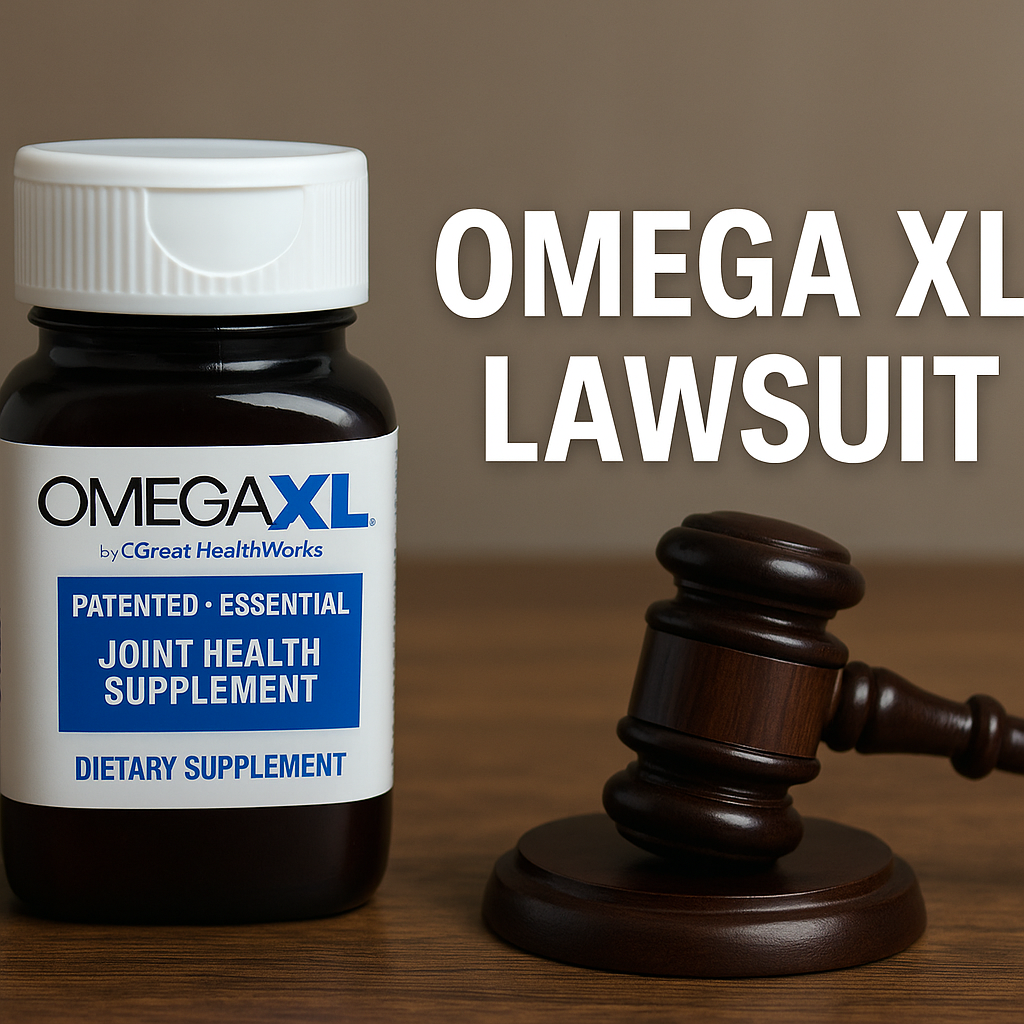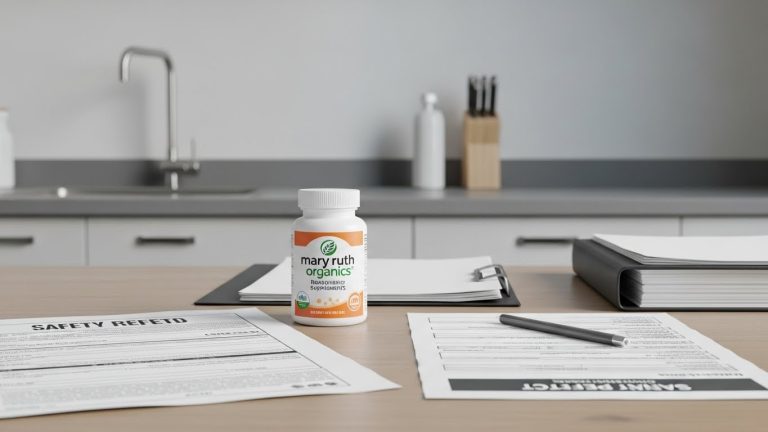The Omega XL lawsuit has sparked a contentious debate on the health supplement space; ethics; and consumer protection. Omega XL is a topical product manufactured by Great HealthWorks that is marketed as a “natural” anti-inflammatory supplement for relief from joint pain. Numerous consumers are asserting that Omega XL did not deliver the promised benefit or delivered adverse side effects. Some consumers, on the other hand, are reporting being charged after requesting a “free trial” and others felt manipulated in terms of their expectations based on the marketing and advertising surrounding Omega XL that bolstered guaranteed results.
The lawsuit relates to those questions – false advertising, undisclosed fees and safety. In general terms, the total customer experience was degraded because of aggressive marketing, without important information offered on the product’s potential outcomes or limitations. This article summarizes what you should consider, or know about, the Omega XL lawsuit. If you purchased the Omega XL supplement, or were affected in any way by Omega XL, you have the right to know what your options are. You will find out how to get into a class action lawsuit, how to get your money back, and most importantly, what you can do to protect yourself from being harmed any further. You have a voice, and you have legal options.
What Is the Omega XL Supplement?
Omega XL is touted as a natural remedy for ongoing joint pain. Omega XL’s proprietary oil extract comes from green-lipped mussels from New Zealand. The company tells us that this oil blend has more than 30 fatty acids—which they claim is a more potent source than fish oil. According to Great HealthWorks, Omega XL can:
- Reduce inflammation and discomfort in the joints – Their commercials claim that Omega XL will deliver noticeable relief without the use of over-the-counter-term medications.
- Improve flexibility and physical mobility – Omega XL is marketed to help older adults regain use of the mobility lost through aging and arthritis.
- Work without side effects – The company stresses that the product has no fishy aftertaste or upset stomach, which are commonplace with omega-3 supplements.
The problem? These claims are not fully backed by large-scale, peer-reviewed human trials. Omega XL skipped rigorous scientific vetting before going to market. That raises red flags about its safety and effectiveness, especially for long-term use.
Why Are People Suing Omega XL?
Consumers began filing lawsuits after discovering serious inconsistencies between Omega XL’s claims and their personal experiences. Several types of complaints emerged, all pointing toward deception and harm.
- False advertising – Consumers say Omega XL was sold with misleading claims. The company used phrases like “clinically shown to reduce pain,” but there is little verified research. Many users felt they were tricked into buying based on exaggerated health benefits.
- Misleading endorsements – Omega XL ads feature public figures, actors, and physicians recommending the product. Critics argue these endorsements were paid, yet lacked proper disclaimers. That violates FTC advertising laws.
- Hidden recurring charges – Customers accepted a free trial and were then billed automatically each month. Many say they were never informed of these charges clearly, and cancelling was difficult.
- Physical side effects – Some users reported unexpected symptoms like nausea, dizziness, bloating, skin irritation, or headaches. These effects contradict the product’s “no side effects” promise.
- Poor disclosure practices – Users claim the company buried key information about ingredients, refunds, and billing. They struggled to get clear answers from customer service.
These combined issues form the backbone of the Omega XL lawsuit, now being examined by courts and consumer protection agencies.
Legal Claims in the Omega XL Lawsuit
The Omega XL lawsuit presents several legal violations under federal and state law. Each legal claim targets a specific way the company may have deceived or harmed customers.
| Legal Violation | Explanation |
|---|---|
| False Advertising | Omega XL made exaggerated, unproven claims about pain relief and safety. |
| Consumer Fraud | The billing process misled buyers into hidden subscriptions. |
| Negligent Misrepresentation | The company failed to verify or disclose health risks associated with the product. |
| Unjust Enrichment | The manufacturer profited by misinforming buyers and denying refunds. |
| Breach of Warranty | Omega XL did not perform as advertised, violating implied product guarantees. |
Class action suits and individual cases aim to penalize these behaviors, secure refunds, and prevent further abuse of consumer trust.
What Compensation Can Plaintiffs Seek?
If you were harmed by Omega XL, you may be eligible for compensation. Courts allow several types of damages depending on your case details:
- Product refunds – Consumers who were misled about Omega XL’s efficacy can claim full or partial refunds.
- Medical expenses – If you experienced physical negative effects as a result of Omega XL and sought treatment, you can seek reimbursement for doctor appointments and prescriptions.
- Emotional harm – You may also qualify for further compensation if you experienced acute anxiety, pain, or embarrassment as a result of using the product at issue.
- Punitive damages – In serious cases of misrepresentation, courts can order financial punishment of Great HealthWorks to deter them from further conduct violations.
Joining a class action gives you access to shared compensation. Filing an individual lawsuit, especially with medical documentation, may lead to a higher personal award.
How to Join or File a Lawsuit
If you purchased Omega XL and feel misled or harmed, taking action is simple but time-sensitive. Here’s what you should do next:
- Collect your records – Save receipts, bank statements, bottles, email confirmations, and records of any medical visits. This proves your purchase and links your health concerns to the product.
- Speak with a lawyer – Look for attorneys specializing in consumer fraud or supplement lawsuits. They can assess your case and help you join an active class action or file your own claim.
- Submit complaints – Report your case to the Federal Trade Commission (FTC), your state’s attorney general, and the Better Business Bureau. Government agencies track these reports and build cases against violators.
- Follow updates – Lawsuits evolve. Stay informed through news outlets or your attorney’s updates so you don’t miss filing deadlines.
Act fast. Every state limits how long you can file a lawsuit. The sooner you act, the stronger your case will be.
Consumer Protection and Supplement Laws
Dietary supplements like Omega XL fall under looser rules than prescription drugs. However, manufacturers are still required to follow core consumer protection laws.
Key Legal Frameworks:
- DSHEA (1994) – Allows companies to sell supplements without pre-approval but requires truthful labeling and responsible claims.
- Federal Trade Commission Act – Prohibits deceptive advertising. All marketing must be honest, and paid endorsements must be disclosed.
- FDA Oversight – The FDA can take action post-market if a supplement is unsafe or mislabeled. Though it doesn’t approve supplements beforehand, it monitors complaints.
If Omega XL broke these rules, regulators can force label changes, fine the company, or demand a recall. Consumers who suffered harm can also seek civil compensation.
FAQs
Is Omega XL approved by the FDA?
No. The FDA does not review or approve dietary supplements before sale. However, it may investigate if safety concerns emerge.
What are Omega XL side effects?
Reported issues include bloating, diarrhea, nausea, dizziness, and skin rashes. Some users experienced serious reactions that required medical care.
Can I sue if I bought Omega XL years ago?
Yes, depending on your state’s time limits. Many allow 2–4 years from when you noticed harm or billing issues.
Do I need a lawyer to join the lawsuit?
You can file a claim alone, but a lawyer improves your odds of success. They handle paperwork, deadlines, and negotiations.
How do I file a complaint?
Visit www.ftc.gov, contact your state attorney general, or use the Better Business Bureau site to document your issue.
Conclusion
The Omega XL lawsuit highlights why consumers must demand honesty from health product companies. People bought the supplement expecting safe, effective joint relief. Instead, many received hidden charges, health issues, or empty promises.
If you feel deceived by Omega XL, you are not alone. Class action suits and consumer claims aim to hold Great HealthWorks accountable. Compensation is possible—and change happens when consumers take a stand. To protect your rights, act now. Gather evidence, consult a lawyer, and report your experience. Legal pressure forces companies to change, and your claim adds weight to that effort.
The supplement industry remains under-regulated. Until laws improve, consumers must stay informed, ask questions, and report suspicious products. Visit official sources, research ingredients, and read terms before buying.
Stay alert. Your health—and your money—deserve protection.
Ayesha Awais is a content writer for JudicialNexus.com, covering accident reports, injury-related news, lawsuits, and public safety updates. All content is informational in nature and based on publicly available sources.




